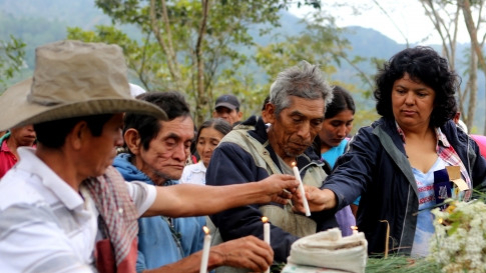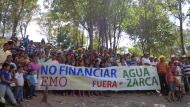Berta Cáceres: new rules for banks could help stop defender killings

In 2016, the Honduran environmental activist Berta Cáceres was killed trying to protect her ancestral lands against the Agua Zarca hydroelectric project, bankrolled by European financial institutions.
The killing provoked international condemnation. Last year, the European Union (EU) proposed a law that could stop companies profiting from projects linked to the repression and murder of environmental defenders. However, European countries are backing a version of the law that would let investors off the hook and allow them to keep funding developments that communities strongly oppose, like Agua Zarca.
Approved after the 2009 coup d’état in Honduras, the Agua Zarca dam was part of a series of environmentally destructive megaprojects that would affect indigenous groups. The Honduran government authorized the dam without consulting the Lenca community, who opposed the project as it infringes on a sacred river. Climate Diplomacy reports that the dam also threatened to drain local water supply, damage the environment and destroy local communities’ livelihoods.
European investors backed the project despite a well-documented murder connected to it, which had led others to pull out. It was initially financed by the International Finance Corporation (IFC) and carried out jointly by the Honduran Company Desarrollos Energéticos SA (DESA) and Sinohydro, a Chinese state-owned company and the world’s largest dam developer. The project came to a halt in 2013 after Tomás García, an indigenous community organiser, was shot at a peaceful demonstration against the dam.
The IFC and Sinohydro cut their funding, with the latter citing “serious interest conflicts which were treated as unpredictable and uncontrollable.” International media outlets and civil society organisations also documented and denounced state repression and violence following Tomás García’s murder.
The Dutch development bank FMO and the Finnish investor Finnfund decided to finance the construction of the dam in 2014 despite this evidence, and a direct plea by Berta Cáceres and the organisation she led, the Civic Council of Popular and Indigenous Organizations (COPINH), not to do so. Violence continued, including vicious machete attacks against the members of the Lenca community that fractured the skull of 12-year-old Paolo.
Prolonged aggression against the Lenca community culminated in the assassination of Berta in her home in La Esperanza on the night of March 2nd, 2016. The murder sparked global outrage. In 2022, Roberto David Castillo, the CEO of DESA, was sentenced to 22.5 years imprisonment for planning and ordering the assassination.
FMO and Finnfund only suspended loans to the Agua Zarca project once another activist, Nelson García, was murdered twelve days later. FMO commissioned a report that appeared to downplay state repression and DESA’s involvement in the reprisals while highlighting intra-community tensions and emphasising the project’s benefits for the community. They finally withdrew their funding and exited the project in 2017. However, on their way out, they reportedly forgave the loan, gifting the dam effort over US $6.1 million. Both companies stated that they “had to give up the repayments on their loans and the interest on those loans in order to reach an Exit,” The Intercept reports.
After Berta Cáceres and Nelson García’s murders, FMO and FinnFund told the Guardian that they “intend to exit as soon as possible. However, project financing being a complicated field, many aspects and issues ha to be cleared from contractual and responsibility perspectives.”
A chance for change
Despite such cases – which highlight investors’ role in financing harmful projects - EU countries agreed to let the financial sector off the hook from mandatory environmental and human rights due diligence obligations in a December 2022 political agreement.
This means that the world’s biggest investors - such as BlackRock, who manage $10 trillion in assets - would not face any additional due diligence obligations. If this version of the law were to pass, egregious human rights and environmental abuses like Berta Cáceres’ murder could continue happening.
Her killing is far from an isolated case. Global Witness has reported at least 1,733 land and environmental defender murders in the past decade. 2023 has already seen two more: Honduran defenders Aly Dominguez and Jairo Bonilla were killed after they tirelessly organized resistance against an open-air iron oxide mine in the village of Guapinol.
If Members of the European Parliament do not back a stronger version of the law and ensure that financial institutions are held accountable for the projects they finance, injustice and violence will persist.
In a letter to European Commissioners Reynders and Breton, Berta Zúñiga Cáceres, Berta Cáceres’ daughter and the General Coordinator of COPINH, emphasised her community’s conviction that including the financial sector in the law would have prevented the Agua Zarca project and the violence it generated from taking place.
Tomorrow, the European Parliament can vote to ensure a new due diligence law includes the financial sector. It has the chance to ensure people and the planet are protected over profits. It should take it.

